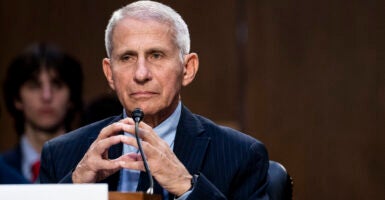Dr. Anthony Fauci, once the highest-paid employee of the federal government, might have to pay back his salary for his final year at the National Institutes of Health, based on a congressional committee’s finding that he wasn’t legally appointed by the Biden administration.
Republicans on the House Energy and Commerce Committee announced Monday that they sent a letter Friday to Health and Human Services Secretary Xavier Becerra pointing out that Fauci and 13 other NIH officials weren’t formally reappointed to their positions in December 2021.
Their letter states that the law “requires the Secretary of HHS to reappoint NIH IC [institute and center] directors, including those who were serving at the time of the law’s enactment when their five-year terms expired on December 12, 2021.”
Fauci, who retired at the end of 2022 as the dominant face of the nation’s controversial fight against COVID-19, was the long-time director of NIH’s National Institute of Allergy and Infectious Diseases.
“The failure to reappoint the above NIH IC directors jeopardizes the legal validity of more than $25 billion in federal biomedical research grants made in 2022 alone,” says the letter to the HHS’ Becerra signed by House Energy and Commerce Chair Cathy McMorris Rodgers, R-Wash.
McMorris Rodgers’ letter addresses government grants in the context of the Antideficiency Act, a law that prohibits federal agencies and officials from spending federal funds without congressional authorization.
The terms of Fauci and the other NIH officials expired in December 2021; Fauci remained until his retirement at the end of last year. As of 2020, Fauci was paid $434,312 a year, the New York Post reported; that salary was up from the $419,608 in 2019 reported by the watchdog group Open the Books.
Conservatives have been critical about what they say is Fauci’s lack of transparency over his support for U.S. funding of gain-of-function research that may have created the dangerous coronavirus that causes COVID-19, and for his resistance to evidence that the virus escaped from a government lab in Wuhan, China.
“For Dr. Fauci and 13 other NIH officials whose terms had expired and failed to be reappointed, they would be guilty of a violation of the act if they knowingly—knowingly—accepted federal salaries, or worse, made grants to institutions or organizations that they were not legally authorized to make,” Robert Moffit, a former senior federal official in both the Department of Health and Human Services and the Office of Personnel Management, which oversees the federal workforce, told The Daily Signal.
Moffit currently is a senior fellow in The Heritage Foundation’s Center for Health and Welfare Policy. The Daily Signal is Heritage’s multimedia news organization.
“If guilty of such a violation, they would be required to reimburse the federal government for their salaries, and the grants would at least be subject to litigation from competitors in the research community who lost grant opportunities in a lawful process,” Moffit said.
Reached by The Daily Signal, a House Energy and Commerce Committee aide said it is “too early to tell right now” whether the Antideficiency Act also requires that unauthorized salaries be reimbursed.
The House committee determined that the failure to follow procedure calls into question any decisions made by the 14 NIH institute and center directors since December 2021. Those include the approval of billions of dollars in taxpayer-funded grants to controversial entities such as the EcoHealth Alliance, as well as COVID-19-related guidance provided by Fauci to the Biden White House.
The letter to Becerra from McMorris Rodgers also was signed by Rep. Brett Guthrie, R-Ky., chair of the Energy and Commerce subcommittee on health, and Rep. Morgan Griffith, R-Va., chairman of its subcommittee on oversight and investigations.
It goes on to say:
As detailed below, it has become apparent that you, as secretary of Health and Human Services, did not reappoint a number of Institute and Center (IC) directors at the NIH. Your failure could have grave implications for the validity of actions taken by 14 NIH IC directors during their unlawful tenure, including former National Institute of Allergy and Infectious Diseases (NIAID) Director Dr. Anthony Fauci.
An HHS official told CBS News, however, that the House committee misrepresented the requirements for the NIH appointments. The official, who spoke to CBS on the condition of anonymity, said that when the terms of the 14 officials expired, the Biden administration correctly reappointed them.
HHS didn’t immediately reply to a request for comment from The Daily Signal.
Directors of NIH’s 27 institutes and centers are “inferior officers” under the law, meaning they aren’t presidential appointees.
In 2016, Congress passed the 21st Century Cures Act. One provision, Section 2033 (“Increasing Accountability at the National Institutes of Health”), stipulates that institute and center directors must be appointed and reappointed by the HHS secretary. This includes those serving when their terms expired Dec. 12, 2021.
The same law requires directors of NIH institutes and centers to “review and make the final decision with respect” to all awards of competitive grants by their institute or center. This provision makes the various directors the final decision-makers on awarding NIH grants.
Have an opinion about this article? To sound off, please email [email protected] and we’ll consider publishing your edited remarks in our regular “We Hear You” feature. Remember to include the url or headline of the article plus your name and town and/or state.































